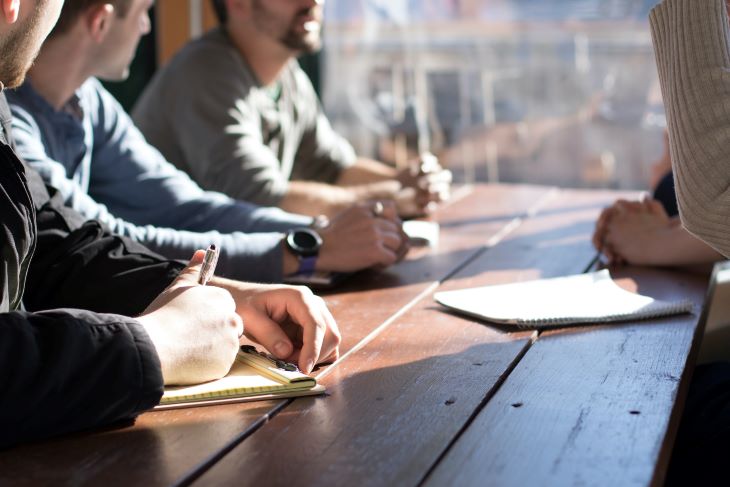The Link Between Alcohol and Aggression
Drinking alcohol not only takes a toll on our bodies, it also affects our minds.
While some transform into affectionate, chatty, and confident personalities when they’ve had a few, others become sad, angry, and even violent.
We’ve all witnessed the aggressive behaviour of someone who’s had one too many, and now there’s growing evidence to suggest that alcohol is more of a problem than we might think.
Alcohol may have a reputation for being a legal and harmless high, but the World Health Organisation now suggests alcohol is more likely to make people aggressive than any other psychotropic substance.(1)
What are the Effects of Alcohol on the Brain?

Below, we outline two ways alcohol affects negatively affects the brain:
1. Reduced Cognitive Function
When we’re sober, we think rationally, which means we’re more capable of considering misunderstandings, pondering how others might be feeling, and understanding the consequences of our actions.
These are all cognitive processes that go on within the prefrontal cortex of the brain(2), which we use to make better choices and stay out of trouble.
Throw alcohol into the mix however, and the prefrontal cortex is left impaired.(3)
Scientists have found that alcohol slows down neurotransmission, leading to a less efficient cognitive process.(4)
What we’re left with is a brain that’s more likely to respond with anger to any small inconvenience or provocation, leading to an increased decision to hurl an insult or even show physical aggression.(5)
In 2011, 31.8% of violent acts across Germany were committed by people under the influence of alcohol.(6)
Alcohol myopia is a name given to the intoxicating effects of alcohol, and the way it impairs perception and makes you more focused on your immediate desires.
This is caused by reduced plasticity in the amygdala and hippocampus.(7)
When we experience tunnel vision for what we want right now, we forget about other responsibilities, and what’s good for us in the long run.
This can lead to aggressive and violent behaviour, as we’re more likely to give in to the temptation to retaliate if something angers us.
2. Reduced Empathy

Empathy is what makes us capable of noticing and understanding the feelings of others, and allows us to put ourselves in another person’s shoes.
Neuroimaging research published by PubMed shows that the part of our brain responsible for these feelings is known as the anterior insular.(8)
Studies into the effects of alcohol intoxication on empathy levels have found that alcohol inhibits these areas of the brain and therefore increases alcohol-induced aggression.(9)
How Does Long-Term Alcohol Abuse Affect the Brain?

When you drink alcohol often, your brain and body changes to try to keep up with this constant influx of chemicals.
One of these changes is the serotonergic system. This is the process through which you receive serotonin – a chemical responsible for happiness.
In a healthy brain, serotonin transporters help this vital hormone to carry messages throughout your body.
In alcoholics, this system is dysregulated, which can lead to depleted levels of serotonin.(10)
Since serotonin is involved in the regulation behaviour, alcoholics can display increased anger and aggression.(11)
Why Does Anger Lead to Aggression?

According to experts, anything from over-heating in warm weather to feeling disappointed about something can lead to feelings of anger.
Other negative emotional feelings, such as sadness, don’t tend to make us retaliate physically.
Anger on the other hand is more associated with achieving a goal, and leads us to take action by approaching others aggressively.(12)
Alcohol interferes with cognitive control functions and can lead to narrowed perception, which is why people under the influence can become angry.(13)
The Comorbidity of Mental Illnesses and Alcohol Aggression
Researchers have found a correlation between dual diagnosis (substance misuse and severe mental illness), and aggression.(14)
This means that people with mental health problems like depression, anxiety and personality disorders are more likely to experience alcohol-related aggression.
If you or someone you know is suffering from dual diagnosis, a rehabilitation facility with psychiatry can help them to address both of these problems in a supportive environment.
What are the Consequences of Alcohol-Related Aggression?

Negative effects of alcohol on society include:
- Family issues
- Conflict
- Crime
- Murder
- Rape
- Theft (15)
Acute drunkenness contributes to about half of all violent crimes and sexual assaults worldwide.(16)
Between 2019 and 2020, the Department for Education found that parental alcohol was a factor in 16% of child-in-need cases.(17)
Who is Most Likely to Become Aggressive When Drunk?

1. Men
Men are more likely to exhibit aggressive behaviour, according to research.(18)
This could be because they’re more likely to suppress their emotions in everyday life, and use alcohol to try to numb them.
When emotions are ignored, they can come out in unexpected ways, like alcohol-induced aggression.
2. Heavy Drinkers
Since alcohol is associated with violent behaviour, (19) the more a person consumes, the more likely they are to become hostile.
Acute alcohol consumption will only alter a person’s behaviour slightly, but the higher their blood alcohol levels climb, the more out of control they can become.
3. People Struggling With Alcohol Use Disorder
People living with alcohol use disorder can find it difficult to cope without alcohol, or to stop after one drink.
Since they’re drunk more often, this puts them at an increased likelihood of intoxicated aggression.
Binge drinking (drinking a lot in one go) exacerbates all of the effects, increasing their chances of impairment.
4. People With Mental Health Concerns

Mental illnesses, stress and trauma are all risk factors, as one of the main reasons people turn to alcohol is to escape negative moods.
This is known as self-medicating, as the person is using a substance like medicine to try to feel better.(20)
For instance, type one or alcoholism are more likely to have dopaminergic dysfunction, which leads to decreased dopamine.(21)
In these cases, people seek the anxiety-relieving effects of alcohol.
5. Impulsive Personalities
Everyone’s temperament is different, and some people are naturally more amicable or combative.
Alcohol can exaggerate personalities, so people with traits like impulsiveness and thrill-seeking tendencies show more of these characteristics when drunk.
What Should I Do if I Behaved Aggressively While Drunk?

Alcohol makes many people do things they’d rather they hadn’t, so it’s important to forgive yourself if you’ve acted in a way you regret.
Take responsibility for your behaviour, and apologise if you’ve hurt someone.
You may be feeling embarrassed, but you’ll feel a lot better once you’ve bitten the bullet and addressed the elephant in the room.
Reflect on what happened, and how you can take steps to stop this from happening in the future.
Does Alcohol Lead to Domestic Violence?

The consequences of drunken aggression can be serious, especially when it’s happening in the home.
Although alcohol isn’t the only factor, there is a strong link between intoxication and violent behaviour towards family members.
Violence Towards Partners
In the UK police report audit, approximately two-thirds of domestic incidents reported to police were perpetrated “under the influence of alcohol”.(22)
Violence Towards Children
Alcohol and drug use also increases the likelihood of children being harmed.
Recent research showed that 36% of serious case reviews where a child had died or been seriously harmed were inflicted by a parent who was under the influence of drugs or alcohol.(23)
Does Alcohol Lead to Homicide?

There is strong evidence to suggest that alcohol plays a part in extreme violence such as murder.
In a clinical study of people convicted of homicide in England and Wales, 42% occurred in offenders with a history of alcohol misuse or dependence.(24)
How Can I Prevent Alcohol-Related Aggression?

If you or a loved one are showing signs of aggression when drunk, there are ways you can address this and prevent unwanted behaviour in the future.
Seek Help From an Alcohol Rehab Program
If you think you may have alcohol use disorder, cutting down or giving up alcohol is one way to ensure you have a clear head and won’t engage in behaviour you’ll regret.
Residential alcohol rehab is a treatment centre for alcohol abuse, free from relapse triggers.
Rehabs also treat a wide range of addictions and substance use disorders.
Here you’ll be supported with round-the-clock care and coping mechanisms for both alcohol dependency and mental health issues.
There are also many charities offering rehabilitation, like Alcoholics Anonymous, Change Grow Live and We Are With You.
Join an Anger Management Support Group

Feeling in control of your thoughts and emotions can help you to act with a clear head.
The NHS and Mind run anger management courses that can help you to understand your feelings, and express them in a healthier way.
Practice Mindfulness
The only way to understand your anger is to spend time being present with it.
Meditation and mindfulness train your brain into focusing on your anger in a more productive way.
So in the heat of the moment, instead of fuelling the fire, you can take a deep breath and let the emotions pass over you.
Understand the Importance of Being Self-Aware
Self-awareness is your ability to understand yourself and your identity – including your thoughts, feelings and emotions.
Gaining a deeper self-awareness helps to control your anger because when you recognise these thoughts, you can control them instead of them taking control over you.
FAQs

What is the Difference Between Anger and Aggression?
Anger is an emotion we feel in our minds. It can make us hot, restless and filled with adrenaline.
Aggression is the physical action of lashing out with the intent to hurt someone.
This can be verbal aggression (words that are intended to wound), or physical aggression (hitting, throwing things or causing bodily harm).
What are Aggressive Responses?
Aggression is characterised by any behaviour, including verbal attacks which are directed towards people, animals and objects.
Aggression can even include acts intended to harm relationships, such as spreading rumours.
What Constitutes as Violent Behaviour?

Violence is when a person uses force to wound, destroy or kill another being.
It’s similar to aggression, and generally punished more harshly in the eyes of the law.
Does Alcohol Cause Anger Issues?
Many people have anger issues, with around a third of the population saying that their anger gives them cause for concern.(25)
The majority of these people will still experience anger issues even when sober.
Alcohol isn’t the sole cause of anger issues, but it can exacerbate them.
Why Do Only Some People Become Aggressive When Drunk?

Research has shown that people who are better at thinking through the consequences of their actions are less likely to experience intoxicated aggression.(26)
This is because alcohol narrows your attention regarding what’s important.
People who have this tendency already therefore will have an even worse ability to think clearly in a hostile situation when drunk, leading to more alcohol-induced aggression.
The full reasons why some people are far more aggressive when drunk are still being discovered.
Verified Google Scholar professor Brad J. Bushman’s research explains that ‘there is little debate that alcohol is a contributing cause of aggressive behaviour. The extreme complexity of this relation, however, has been the focus of extensive theory and research.’(27)
How Should I Deal With a Loved One Who’s Aggressive After Drinking?

It can be difficult to experience an unfavourable personality change in someone who’s drunk, especially when it’s out of character.
If you try to approach the subject while they’re drunk, this may result in more verbal aggression.
As alcohol will impair their ability to see sense, it’s unlikely you’ll be able to talk them down or help them to feel better.
The best thing to do if you witness alcohol-induced aggression is to remove yourself from the situation if possible, and wait until they’re sober to express how their aggression makes you feel.
Nobody should have to experience abuse from a loved one, so if this is happening a lot, you’ve experienced physical aggression, or you feel unsafe, please see these resources for help.
What is Alcohol Abuse?

Alcohol misuse is a pattern of drinking too much or too frequently.
Unlike having the occasional social drink, this is a disorder where you become dependent on alcohol.
Alcohol abuse interferes with daily life, and needs to be treated with seriousness.
If you’re concerned about problematic drinking or alcohol use disorder, call us on 0800 088 66 86.
References
[1] https://www.ncbi.nlm.nih.gov/pmc/articles/PMC3820993/
[3] https://www.ncbi.nlm.nih.gov/pmc/articles/PMC3593065/
[5] https://www.ncbi.nlm.nih.gov/pmc/articles/PMC8294170/
[6] https://www.ncbi.nlm.nih.gov/pmc/articles/PMC3820993/
[7] https://royalsocietypublishing.org/doi/full/10.1098/rstb.2008.0097
[8] https://pubmed.ncbi.nlm.nih.gov/22961548/
[9] https://psycnet.apa.org/record/2003-00642-013
[11] https://www.ncbi.nlm.nih.gov/pmc/articles/PMC2612120/
[12] https://www.ncbi.nlm.nih.gov/pmc/articles/PMC9174026/
[15] https://www.ncbi.nlm.nih.gov/pmc/articles/PMC4703241/
[16] https://www.ncbi.nlm.nih.gov/pmc/articles/PMC3820993/
[18] https://psycnet.apa.org/doiLanding?doi=10.1037%2Fmen0000199
[19] https://www.ncbi.nlm.nih.gov/pmc/articles/PMC3820993/
[20] https://www.ncbi.nlm.nih.gov/pmc/articles/PMC6175215/
[21] https://onlinelibrary.wiley.com/doi/abs/10.1002/syn.20071
[22] https://www.ncbi.nlm.nih.gov/pmc/articles/PMC8729263/
[24] https://onlinelibrary.wiley.com/doi/abs/10.1111/j.1360-0443.2006.01483.x
[26] https://www.sciencedaily.com/releases/2011/12/111219135215.htm
[27] https://www.sciencedirect.com/science/article/abs/pii/S2352250X17300581




